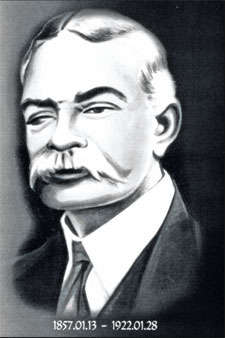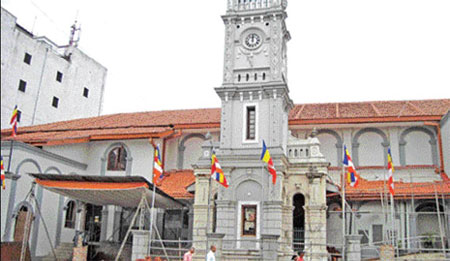|
Variety
John de Silva - the Master of Nurti
John de Silva, a familiar name. Is it or isn't it? There is a John de
Silva hall behind the National Art Gallery. Who is this John de Silva? I
guess many of you know the answer.
He was a playwright (writer of plays) and a play-producer, in an era
long past in what is called the Tower Hall era. You would have read
about the Tower Hall last month (December 11). In that account, two
playwrights were mentioned. Charles Dias and John de Silva. The latter
was the older of the two.
John de Silva's birth and death anniversaries are both in January.
So, this is an appropriate time to write about him.

He was born 155 years ago on January 13, 1857. His parents were
Christians; his paternal ancestral name was Makalandage. His first
school was Christian College, Kotte, one of the two leading English
schools at the time - the other was in Baddegama - and the only boarding
school in the country. Christian College is now Jayewardenepura Maha
Vidyalaya.
He next went to the Colombo Academy in Pettah which later became
Royal College. Sinhala was not taught in schools then. Through his close
association with Pundit Batuwantudawe, he gained a good knowledge of
Sinhala. By the age of 20, he was a teacher at St. Joseph's College.
Later he taught at Wesley College.About this time, when he was a
teacher, a company of actors from Bombay, the Elphinston Dramatic
Company led by K. M. Baliwalla, a Parsee actor-director, staged their
plays in Colombo. The rich and not so rich, came to see these plays
which had plenty of Hindustani and Gujarati songs.
The audience loved them, and the theatre-going public grew in numbers
with each performance during the Company's six-month stay here.
Soon our own people started writing and producing plays like the
Baliwalla plays. C. Don Bastian was one of the main playwrights whose
name has come down the years. John de Silva too started going to the
theatre.
Not only did he become a theatre-fan, but he also started writing
plays.
His first play, Natarajah was staged in 1886. He was not yet 30 years
then. This was followed by Dascon, the story of the love affair between
the Portuguese General and the Sinhala princess Samudra Devi. His third
play Ramayana was staged on May 31, 1891 at the Floral Hall, the best
hall for staging plays. It was staged again on June 5.
That night the Floral Hall caught fire. The curtains, stage sets and
costumes were all destroyed. The rumour was that someone, or some group,
jealous of John de Silva's success had set fire to the hall. He was
shocked and sad, then angry. His anger turned into disgust, and he
decided to give up writing and producing plays.
Later that same year he published that ill-fated play under the title
Sita Haranaya - Abduction of Sita and sub-titled Ginigath Ramayana -
Ramayana that caught fire.
The subtitle caught the people's eye and fancy and the play came to
be known by that name while Sita Haranaya was soon forgotten.
Giving up play-writing, John de Silva joined Law College and passed
out as a proctor. His practice as a proctor must have brought him a good
income, but the call of the theatre was too strong and he started
writing plays again.
After more than 10 years, his new play Siri Sangabo was staged in
1903.
The staging of Siri Sangabo was the beginning of his second and more
successful period as a playwright and producer. The song Danno Budunge
is still sung and still loved after 109 years it was first sung on stage
by the three princess Sanghamitta, Sanghabodi and Gotabhaya as they were
approaching Anuradhapura. It has become part of our national heritage.
 Other
songs that became popular and were sung long, long after they were first
sung on stage are Vessantara Raja Puthe from the play Vessantara and
Amba Damba Naarung Kesel Del sung by Hanuman in Ramayana. Other
songs that became popular and were sung long, long after they were first
sung on stage are Vessantara Raja Puthe from the play Vessantara and
Amba Damba Naarung Kesel Del sung by Hanuman in Ramayana.
After the success of Siri Sangabo, his group of actors - there were
actresses then - became professionals under the name Arya Subhoda Natya
Saba. By then John de Silva had become a Buddhist and a devotee of the
Hindu gods Vishnu and Kataragama.
John de Silva wrote plays based on Sanskrit plays. Shakespeare's
plays such as Othello and Hamlet, and on stories from our own history.
He wrote plays not only to entertain the public, but also to inspire
in our people, a pride of our heritage and a love for the country.
In his own way, he was contributing to the national movement to
regain our independence. He was among the Sinhala leaders arrested and
jailed during the riots of 1915.
The plays John de Silva wrote and all other musical plays of this
class are called Nurti. 'Tower Hall Plays' is another name for these
plays because they were staged at the Tower Hall.
So, when we speak of John de Silva and his nurti, the Tower Hall
immediately comes to mind. But John de Silva had been producing plays
for 25 years before the Tower Hall was built.
What is more, for nearly a decade after the Tower Hall was built, his
plays were not staged there. But from 1920 right through the 1930s the
Tower was the venue for his plays.
The last play he wrote was Nagananda based on a Sanskrit play. He
wrote this in 1919.As I said at the beginning, John de Silva's death
like his birth was in January. He had injured his foot while swimming in
the sea. Being a diabetic the wound had been fatal. He passed away,
after a brief illness, on January 28,1922. He was 65 years old at the
time of his death.
- Sumana Saparamadu |

